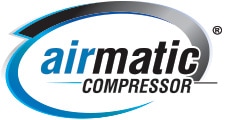Overheating is one of the most common causes of air compressor failure and performance issues. To keep your air compressor operating at peak performance, it is essential to understand what causes air compressors to overheat and have methods in place to prevent air compressors from overheating.
Causes of Air Compressor Overheating
From rising outdoor temperatures to poor maintenance to mechanical issues, numerous internal and external factors can cause air compressors to overheat.
- Ambient Temperature: Rising temperatures in your operation location can cause air compressor shutdowns if special precautions are not in place to counter the changing temperatures and humidity levels. The normal operating temperature range for an air compressor’s discharge line is 170℉ and 190℉. An air compressor operating beyond that range can cause performance issues. Most compressors have an automatic shutdown feature at around 220℉.
- Inadequate Ventilation: Check for proper available ventilation on the air compressor and the space where the compressor resides. Blocked vents on the machine or poorly ventilated rooms can cause performance issues such as recirculation of waste heat.
- Clogged Parts: Similar to blocked or inadequate vents, clogged coolers and inlet filters can cause the air compressor to work harder to perform basic functions, resulting in excessive heat buildup.
- Low Compressor Oil Levels/Eroded Oils: Diminished oil quality and low oil levels affect the operation of the compressor’s internal parts. The oil in an air compressor has three functions; cooling, lubrication, and sealing.
- Failing Thermal Valve: If the thermal valve of the compressor fails, it can cause the air compressor to shut down. It is best to have a replacement thermal valve on hand to prevent potential downtime if the valve fails.
Signs of an Overheating Air Compressor
If an air compressor starts acting differently or becomes inefficient, it’s often because of heating-related problems. Identify an overheating air compressor by looking for the following signs:
- Compressor failing to turn on or start normally
- Tripped circuit breakers when using the air compressor
- Noticing a smell of burnt oil
- Premature wear at an accelerated pace
Prevent Air Compressor From Overheating
Preventing most air compressor overheating problems is as simple as conducting routine maintenance and daily monitoring. Instead of asking how to cool down air compressors, it is better to know tips for preventing them from overheating.
- Implement better ventilation: Ensure improved internal and external ventilation by routinely checking the machine for sufficient venting. Replace vents that cannot facilitate the demands of the machine.
- Evaluate placement: Consider the placement of compressors to avoid direct sunlight, continuously monitor the ambient temperature during operation, and make adjustments to ensure the most efficient operation.
- Monitor oil levels and filters: Regularly check oil levels to ensure it is ideal for meeting required operation demands and the oil’s viscosity is healthy. Also, it’s important to check all filters simultaneously and clean or change any that are excessively dirty or clogged.
- Replace old or out-of-date parts: Keep all components up-to-date to ensure the compressor is still sufficient for your operation demands and, if necessary, update with more optimal components.
- Monitor temperature: Use a temperature sensor or thermometer to monitor the room temperature of the air compressor daily.
Air Compressors From Airmatic Compressor
Identifying an overheating air compressor and preventing overheating is essential to keep production running efficiently and effectively. If you need replacement parts for overheating air compressors or are thinking about upgrading air compressors to meet your changing demands, contact us or request a quote today.
